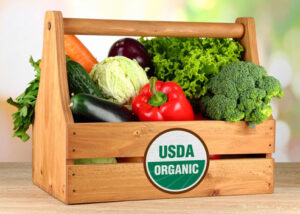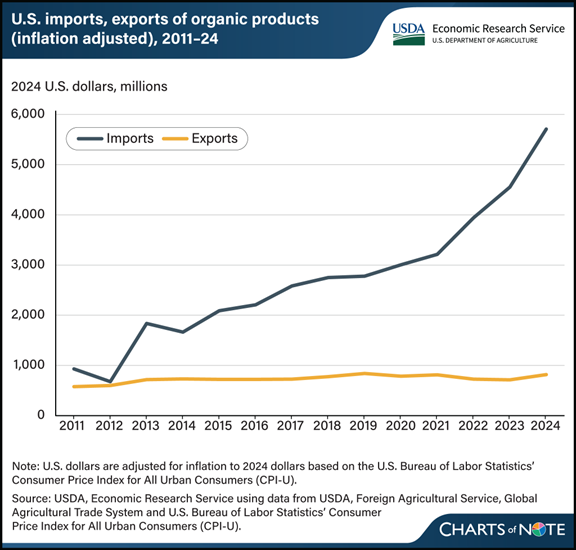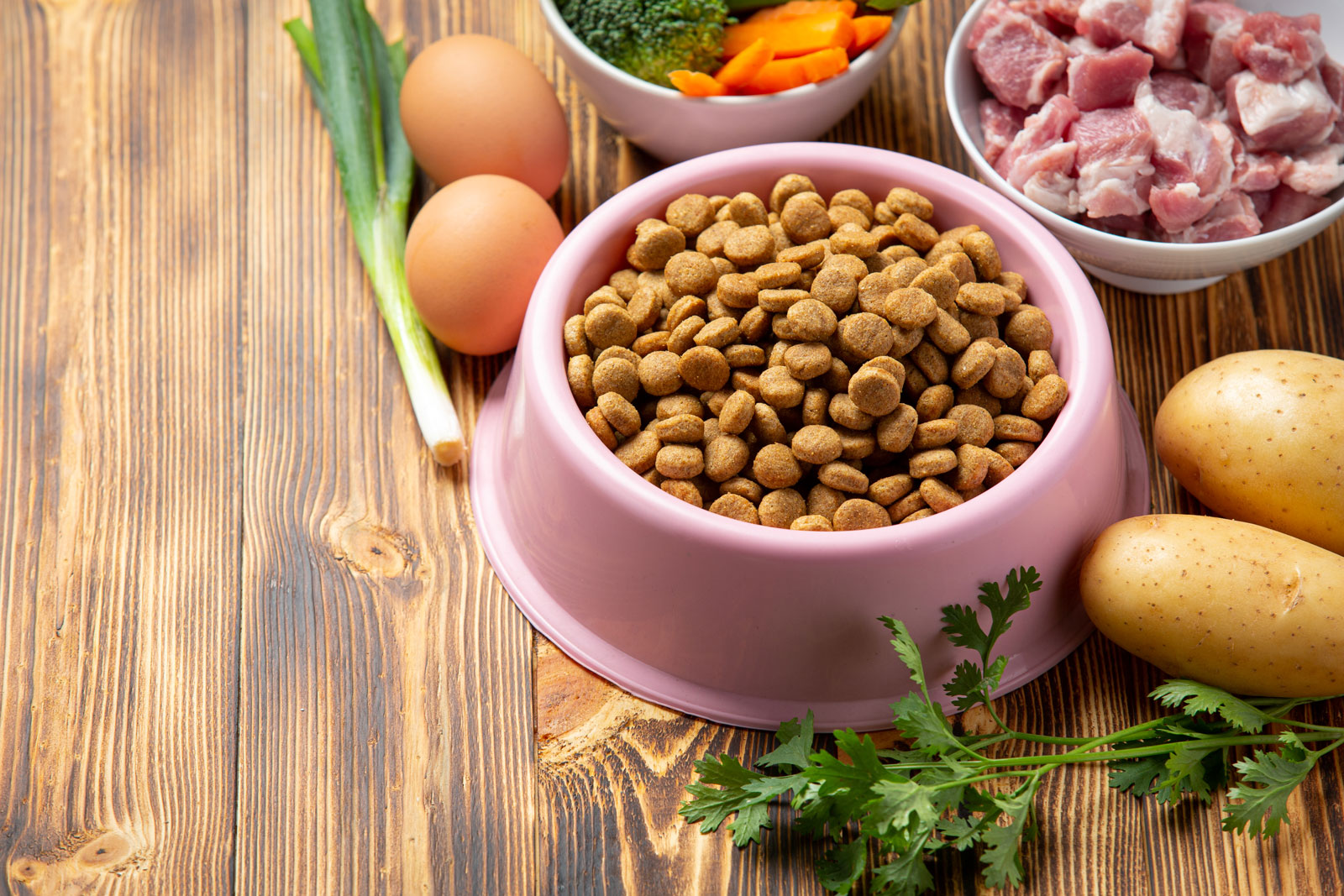“Ambition is the path to success. Persistence is the vehicle you arrive in.” ~Bill Bradley
HOT TOPIC
Pet Food and Mushroom Standards to be Rescinded
Your comments are needed now to save the organic pet food and mushroom standards the organic community has sought for years.
On May 12, 2025, USDA’s Agricultural Marketing Service proposed rescinding the “National Organic Program; Market Development for Mushrooms and Pet Food” rule and regulations, previously issued December 23, 2024.
Comment by June 11, Docket number AMS-NOP-22-0063-3399.
Our take: Although it’s good news to hear that funds promised to farmers and non-profit organizations via the Transition to Organic Partnership Program and the Organic Market Development Grants will be released, we are deeply concerned about the move to rescind organic pet food and mushroom standards.
From the very beginning of the national organic regulations, organic meat producers have been hampered by obstacles and hardships, including a prohibition on labeling their products until the rules were implemented and a lack of markets for byproducts of meat production.
By providing markets for grain and animal byproducts, organic pet food standards are a gateway to increasing organic acreage. These standards were years in the making, and just on the cusp of doing some good.
Your letters of support will go a long way toward upholding the organic livestock community and organic mushroom producers, and assuring the integrity of these products for the people who buy them.
Click here for more of our thoughts on how these standards help drive markets for organic products.
Regulatory Updates
 Retailer Toolkit Available Free
Retailers now have common tools for talking about the value of organic products. The National Organic Program’s new microlearning module (NOP-997) through the Organic Integrity Learning Center. The Retail Toolkit includes graphics, signage and messaging about the four pillars of the USDA Organic Seal, as well as practical examples.
Retailer Toolkit Available Free
Retailers now have common tools for talking about the value of organic products. The National Organic Program’s new microlearning module (NOP-997) through the Organic Integrity Learning Center. The Retail Toolkit includes graphics, signage and messaging about the four pillars of the USDA Organic Seal, as well as practical examples.Our take: Using common language about the organic seal and what it means can amplify these messages, and better reach people where they are choosing food and other agricultural products.
TOPP Shines in New Report
The Transition to Organic Partnership Program’s 2024 Impact Report outlines the program’s many successes, including helping certify 3,863 new operations and more than 260,000 new organic acres across the country. The program conducted nearly 1,500 events reaching thousands of producers and agricultural professionals with technical assistance, and matched 327 transitioning producers with 237 experienced organic mentors.
Our take: The TOPP Program helps America’s farmers tap into the growing organic market in the United States, now valued at over $70 billion, and around the world. Building these opportunities helps farm communities and local economies, too.
The Survey Says…
The US organic market hit $71.5 billion in 2024, up 5.2% annually, according to the Organic Trade Association’s 2025 Organic Market Report. Produce is the top category once again, with 30.1% of total organic sales, and growing 5.2% to reach $21.5 billion. The second largest organic food category was grocery, posting sales of $15 billion in 2024, achieving 4% overall growth. Beverages were the third-largest category up 5.2% to $9.5 billion. Organic dairy and egg sales rose 7.7%, driven in part by shortages due by Avian Influenza.
Our take: Time and again, the organic sector steps up when economic and environmental challenges hit.
 Sweet, Sweet Organic Berries
Sweet, Sweet Organic BerriesOrganic strawberries are sweeter, says a new study in the Journal of Agricultural and Food Chemistry. The researchers conducted taste tests and compared levels of sugars in organic strawberries with berries treated with two commonly used fungicides. Consumers preferred the organic berries, which had higher levels of sucrose and glucose than the fungicide-treated berries.
Our take: We’ve been a fan of organic berries for decades (we’re looking at you, Driscoll’s!), and are gratified that science is catching up to what our tastebuds have been telling us.
Younger Consumers are Buying Natural and Organic
According to survey research from the Acosta group, 89% of GenZ and 85% of millennial consumers bought natural or organic products in the previous six months. Overall, the top reason consumers are choosing natural and organic is products because they believe the products are better for their health. Other high-ranking reasons for purchase include avoiding chemicals and pesticides, avoiding processed foods and supporting environmental health. However, the biggest barriers to purchase are the perception that the products are too expensive and disbelieving the “hype” around the products. In addition, 40% of consumers think that “natural” and “organic “mean the same thing.
Our take: Interest from younger consumers gives us hope for the future of the organic sector. But we need to continue teaching people about the benefits of organic products, and the pedigree of the organic label.
US Organic Acreage Drops; Imports Increase
The USDA’s Organic situation report, 2025 edition offers a glimpse of how the landscape of organic agriculture is changing in the United States and around the world.
Organic acreage in the United States has dropped in recent years, primarily due to reductions in organic pasture and rangelands, even as organic acreage is growing globally. Third in the world for organic acreage in 2015, the United States dropped to ninth by 2022.
Meanwhile, organic imports increased to $5.7 billion in 2024, although some of the increase is due to more accurate reporting as the Harmonized Tariff Schedule updated its codes to include codes for more organic products.
Our take: The Organic Transition Initiative, which includes the Transition to Organic Partnership Program and Organic Market Development Grants, was developed to help address these disparities and foster opportunities for America’s farmers. Investing in those programs makes good sense.

Inside the Beltway
Over $6 Billion Cut From Programs for Farmers
In these times of constant changes to government programs and offices, the National Sustainable Agriculture coalition has done some heavy lifting to track United States Department of Agriculture programs where funding is cancelled, paused or frozen, especially:
- Local Food Purchase Assistance (LFPA)
- Local Foods for Schools and Child Care Settings (LFSCC)
- Inflation Reduction Act (IRA)-funded Rural Energy for America Program (REAP) projects
- Partnerships for Climate-Smart Commodities (PCSC) restructuring
- All told, more than $6 billion promised to America’s agriculture sector is no longer available.
Our take: Farm communities—and beyond—will feel this impact, since many of these programs have a multiplier effect that buoys local economies.
International News
 No GMOs in Kenya, Says Court
No GMOs in Kenya, Says Court
On March 7, 2025, Kenya’s Court of Appeal put a hold on the trade and cultivation of genetically engineered (GE) products until an appeal filed by the Kenya Peasants League is fully heard in the coming months. The court’s injunction prohibits the importation or commercialization of GE crops, seeds, or food in Kenya, and suspended any associated executive orders on GE products.

Mexico’s Constitution Now Bans GMO Corn
In an historic move, the Government of Mexico published a constitutional amendment on March 17, 2025 that codifies Mexico’s existing restrictions on genetically engineered (GE) corn. The constitutional amendment prohibits domestic cultivation of genetically modified corn and requires other uses of such corn to be free of threats to Mexico’s biosafety, health, and biocultural heritage.
Our take: Organic products are grown without genetically modified organisms. These bans may open opportunities for farmers and encourage more robust local organic markets.
Taking a Count
Organic Fresh Produce in the US
$9.5 billion: US Organic Fresh Produce Sales, 2024
5.7%: Increase in US Organic Fresh Produce Sales
2.7%: Increase in US Non-organic Fresh Produce Sales
12%: Organic Fresh Produce Share of US Retail Market, Sales
7%: Organic Fresh Produce Share of US Retail Market, Volume
From the Organic Produce Network’s “State of Organic Produce 2024”
Organic Community
 Meet Our Associate
Meet Our AssociateMark King is an experienced professional with a track record of measurable impact in sustainable, regenerative and certified organic initiatives and projects.
His work has earned him a reputation for success at the national level and his skill as a leader has allowed Mark to serve as a driving force for collaborative ventures.
Mark served on the NOSB from 2000-2005 representing Retailers and has been engaged as a consultant for over 20 years. Consistent engagement with critical aspects of food production, handling and marketing has consistently resulted in consistent and valued success for projects.
Mark’s personal commitment to the advancement of the field and support for community extends to his volunteer service where he mentors those new to the workforce, guides investment in arts programs serving communities in need and supports youth development through athletics.
Oregon’s Extension Service Goes Organic
Oregon State University’s Organic Agriculture Program features six full-time faculty members focused on organic, regenerative and low-input agriculture systems in extension positions, billed as first team of its kind in the United States. The extension agents bring their expertise to all types with a variety of growing systems on farms across the state.
Our take: Congratulations, Oregon State Extension! The depth of knowledge in your team is remarkable, and a great resource for Oregon’s agriculture sector.
 Wolf & Associates Proudly Supports the Organic Trade Association’s Educational Webinar Series
At Wolf & Associates, we are committed to strengthening the organic industry by supporting education, advocacy, and collaboration. That’s why we are proud to sponsor the Organic Trade Association (OTA) and their educational webinar series, designed to provide valuable insights and guidance on critical industry topics.
Wolf & Associates Proudly Supports the Organic Trade Association’s Educational Webinar Series
At Wolf & Associates, we are committed to strengthening the organic industry by supporting education, advocacy, and collaboration. That’s why we are proud to sponsor the Organic Trade Association (OTA) and their educational webinar series, designed to provide valuable insights and guidance on critical industry topics.Keep an eye out on our LinkedIn page for details about the second webinar in the series slated for mid-June and focusing on Animal Welfare.
OTA is Hiring
The Organic Trade Association has openings for a Communications and Marketing Manager, and an Industry Relations Coordinator. Both positions have remote work options.
 In the News: Connie Karr
In the News: Connie KarrFarm Progress featured Connie Karr, one of our Consulting Associates, and her recent talk at the Organic Seed Alliance conference in Corvallis, Oregon. She emphasized maintaining regular communication with organic certifiers to avoid issues in organic certification, and covered several common challenges farmers face during the organic certification process, including maintaining consistent records with receipts.

